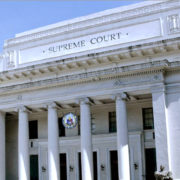The Supreme Court (SC) on Tuesday, February 19, junked four petitions challenging the constitutionality of the martial law extension in Mindanao.
The legality of the extension was upheld by the justices in session with a voting of 9-4.
The petitions against the third extension were from opposition lawmakers led by Albay Rep. Edcel Lagman, the Makabayan bloc of party-list groups in the House of Representatives, lawyers led by former Election Commissioner Christian Monsod, and and a group of “lumad” (indigenous) teachers and students represented by the Free Legal Assistance Group.
All four groups alleged in their petitions that there was no factual basis to justify the martial law extension in Mindanao.
In their arguments, they said the attacks by terror groups and violent incidents that took place in Mindanao last year, including four bombings cited in the report of the Armed Forces, were acts of terrorism. They were not acts of rebellion as required by law in declaration of martial law.
The petitioners also insisted that public safety in Mindanao is not imperiled, despite the recent twin bombings at the Jolo Cathedral in Sulu that killed at least 21 people.
Solicitor General Jose Calida, however, stressed that the several attacks attributed to the New People’s Army (NPA) in Mindanao were acts of rebellion.
He cited the Jolo Cathedral bombing, saying it was proof of the ongoing threat to public safety in Mindanao posed by local terrorist groups.
He also argued that the Congress had the power to determine the sufficiency of the factual basis for the extension of martial law. Moreover, the president’s declaration of of martial law, concurred in by Congress, is beyond judicial review.
According to new SC spokesman Brian Keith Hosaka, the nine magistrates who voted for the dismissal of the petitions were Chief Justice Lucas Bersamin and Associate Justices Diosdado Peralta, Mariano del Castillo, Estela Perlas-Bernabe, Andres Reyes Jr., Alexander Gesmundo, Jose Reyes Jr., Ramon Paul Hernando and Rosmari Carandang.
The four dissenters, meanwhile, were Senior Associate Justice Antonio Carpio and Associate Justices Marvic Leonen, Francis Jardeleza and Alfredo Benjamin Caguioa.
A “rubber stamp” for Malacañang
The announcement of SC’s decision was immediately met with flak from different party-list groups.
Neri Colmenares, chair of Bayan Muna, said, “The Supreme Court has once again stretched the boundaries of judicial interpretation by upholding Congress’ approval of President Rodrigo Duterte’s extension of martial law in Mindanao. It paves the way for imposing martial law nationwide even if there is no threat to public safety.”
Gabriela Rep. Arlene Brosas called the SC an AFP appendage, saying, “Where will Filipino women and the people turn to for justice and accountability during these dark times of impunity if the Supreme Court itself is already an appendage of the Armed Forces of the Philippines and its commander-in-chief?”
Kabataan said the SC had reduced itself into a “rubber stamp” for Malacañang with its decision.
“Once again, the [Supreme Court] as the rubber stamp of Duterte’s antipeople tyranny has declared the constitutionality of a third martial law extension in Mindanao, no matter how more and more absurd it is getting,” the group stated.
Magdalo Rep. Gary Alejano took a jab at the Supreme Court by saying it “bowed down to the whims of the Executive branch.”
“Where is our independent Supreme Court? Instead of being a vanguard of justice and rationality, the Supreme Court has shown otherwise,” he added.
Alliance of Concerned Teachers (ACT) maintained that there was no basis to declare the third extension as constitutional.
“The only terrorism still lurking in [Mindanao] is state terrorism, brought by elements of the Armed Forces of the Philippines, paramilitary forces and the Philippine National Police who drive lumad children out of their schools, illegally detain people without warrants of arrest, charge them with trumped-up cases and tag them as terrorists,” ACT Rep. Antonio Tinio said.
The Communist Party of the Philippines (CPP) also spoke against SC’s decision, saying that upholding the legality of the third extension of martial law in Mindanao would lead to more abuses by government forces.
“By upholding the third extension of martial law, the Supreme Court has further emboldened the military and police personnel who are daily committing abuses of power,” said CCP in a statement.
“With this decision, the Supreme Court has once again demonstrated its servility to the tyrannical Duterte regime,” it added.
Palace “pleased”
Malacañang, on the other hand, said it was “pleased” with the ruling.
“We are also pleased to note that the executive, legislative and the judiciary are on the same page in quelling the rebellion as well as combatting and dissipating terroristic acts destructive to lives and properties unleashed by ruthless and barbaric local and foreign armed lawless elements,” presidential spokesperson Salvador Panelo said.
“As we fast track the rehabilitation of the war-torn Marawi and promote security and peace and order in Mindanao, we ask the Filipino nation not to waver in their support for our Republic’s defenders,” he added.
Defense Secretary Delfin Lorenzana, for his part, thanked the Supreme Court for agreeing with the government.
“[Martial law] has and will continue to greatly help our counterterrorism [operations] and fight against rebellious forces in Mindanao,” Lorenzana said.
Martial law in Mindanao was first declared by Duterte on May 23, 2017 after the ISIS-inspired Maute group laid siege to Marawi City.
Despite the liberation of Marawi five months later, Duterte still extended military rule in Mindanao up to the end of 2017 and then up to the end of 2018 to enable the military to finish the remnants of the terror groups that seized Marawi. Both extensions were approved by the Congress.
In December, Congress approved Duterte’s request for a third extension of martial law.






